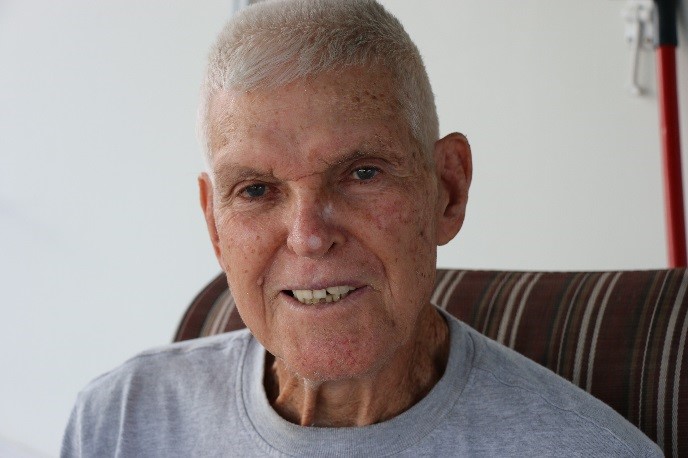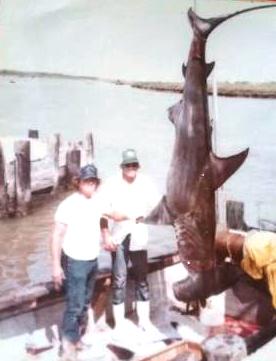[spacer height=”20px”]
[spacer height=”20px”]
In a little shack at the end of a cotton field outside of Weslaco, Texas, on March 19, 1932, Lacy Smith was born to Rady Elizabeth and Ruppert Allen Smith with the help of a midwife. Soon after, Lacy’s family moved to Loyola Beach near Riviera, Texas. There he started his career as a commercial fisherman. Evenwhen the Texas State Legislature banned commercial fishermen from catching redfish in 1981, he found a way to continue in the business until 2009 when he suffered a stroke.
Lacy was never afraid of the water because he was raised on it. “I used to carry the bait bucket while my mother and father seined for bait. I’d go out in the boat with my mother. She’d row out into the bay, and I’d go with her and catch fish to sell. I was two years old then,” he recalls.
“Nothing about it scared me. I grew up on the water,” he said, saying that he “learned to swim in Baffin Bay when the water was so salty you couldn’t stay under.” Lacy remembered what should have been a scary moment in his life but wasn’t. “One time I fell off my shrimp boat in the Gulf. I was by myself, and I got back on board. Most of the time I worked by myself. You couldn’t get anybody to help you. I had a policy; if I couldn’t do it myself, I didn’t even start it,” said Lacy, a philosophy that guided him through life and made a successful commercial fisherman out of him.
In a 1988 interview conducted by Nathan Wilkey, Lacy described himself as a “gypsy, moving up and down the Texas coast to follow his livelihood, commercial fishing, as a child and as a father of four.” As a child Lacy attempted school in three places: Port Isabel, Loyola Beach, and Flour Bluff. When he arrived in Flour Bluff ready to start the fourth grade, his teacher saw that he was far ahead of the other students and moved him to fifth grade. Lacy remained in Flour Bluff Schools until the first day of his sophomore year when Coach Meixner asked him if he really wanted to be there. When Lacy said, “Not really,” the coach suggested he go on home and focus on his fishing, which he did.
“I sustained my family as a commercial fisherman,” said Lacy.
According to his wife, Lilia, he made a “very good living” as a commercial fisherman.
[spacer height=”20px”]
Lacy Smith and Ricky Allen caught this shark at the mouth of the Bernard River near Freeport, Texas, in the early 1980s. The fins were sold to Japanese markets in California and the body was sold to other markets. The fishermen were trying to overcome the ban on redfish by creating new markets for their catch, according to Smith.
[spacer height=”20px”]
Lacy, like many people in those days, worked hard to survive. In the Wilkey interview, he tells of how his family acquired the necessities of life. “Lacy spoke of his early childhood days when the family would go to town by wagon. They would tie up the horses on the outskirts of town, a meeting place for the families who lived outside of town, and walk into town to buy supplies.”
When Lacy moved to Flour Bluff with his mother and stepfather, Lester “Wild Bill” Wyman, he lived along Laguna Shores in a one-room house that sat between Knickerbocker and what was then Davis Drive (South Padre Island Drive). “They built a bunkhouse for the boys to sleep out back. Later they built lean-tos until it was four or five rooms. They built them one at a time. It would start as a porch; then, we’d turn it into a room,” said Lacy.
“People in Flour Bluff collected rain water in cisterns, usually off their roofs when it would rain. It rained a lot back then. Some people got their water from wells they dug by hand. My mother never had running water while she was alive. She sometimes hauled water in barrels from the school house,” Lacy said.
Lacy’s mother continued to fish and shrimp, but Lacy does not remember eating much of her catch. “She used to shrimp for Red Dot Bait Stand and sell shrimp for a penny a piece. She’d go over there at night and dip up shrimp with a dip net and sell them to Ace Kimbrell. We didn’t eat a lot of fish and shrimp. Our diet was mostly potatoes and beans. We didn’t have meat unless we killed something. We had no means of refrigeration. We killed ducks, geese, rabbits, whatever we could find,” he said.
When asked if they hunted deer, Lacy said, “I don’t remember any deer in Flour Bluff when I was a kid. The pioneer families who lived here had hunted them out.”
Lacy spoke with great respect about his parents. “Mom never forsook us or left us or abandoned us. She always took care of us and was the best at taking care of money. Everybody back in that day did. My daddy kept a ledger. He knew how much he made each day and how much he spent. He could go back thirty years and tell you what he’d done that day.”
Lacy’s stepfather, Wild Bill Wyman, was a machinist from Detroit. “People called him Wild Bill because he showed up in a boat that had that name painted on it. All of us kids used the name Wyman when we attended Flour Bluff Schools.”
“I left home at 14 years old. Sidney Herndon down at the L-Heads put out big boats on percentages. I got a 40-foot boat by myself. It was named The Lee. Trout was 25 cents a pound. I had 285 pounds the first time I went out. I caught them on rods and reels in the Bird Island area,” said Lacy. ““I had a 14-foot skiff with a 7 ½ hp outboard motor and a rod and reel at the start. Later, I ran lines, used gill nets, line seines, dynamite. I fished every way there was to fish.”
NOTE: This article was first published in The Texas Shoreline News, a local print paper that serves the Flour Bluff, Padre Island, and South Side areas of Corpus Christi.


